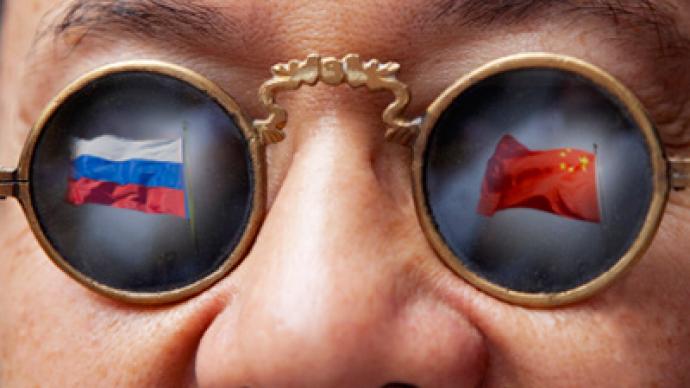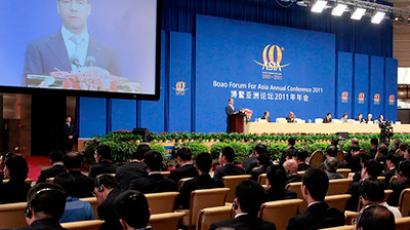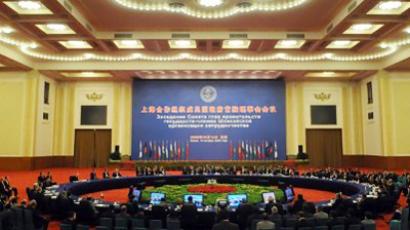Russia and China can build new world order – political scientist

As the leaders of two of the world's biggest and fastest-growing emerging economies meet in Moscow, political analysts predict the strategic co-operation between the two nations could shift the balance of power in the world.
“I believe the world is now at a historic crossroads,” Dr Kiyul Chung told RT. “Or some may say the world is at the brink of either being subdued or overcoming the US/NATO military intervention in Libya, [which is] now moving possibly to Syria or even to Iran, if Russia and China, or [the] Shanghai Co-operation Organization are [too] weak to stop US-led NATO military aggression in [the] North African region So I hope Russia and China [can] lead this new global movement to balance the power in the world, so they can build new world order where no more unilateral, aggressive or even colonial methodology [is] being put into a sovereign nation such as Libya.”“China-Russia trade and economic relationship and huge development between the two nations, I believe, is not only impacting the European continent, but also the global scene,” added Dr Kiyul Chung. “This economic and trade relationship is not limited only to economy, it is also a strategic relationship. So, it is going to have a huge impact on the world.”
US are jealous of Russian-Chinese ties – political analyst
Chairman of the Russian-Chinese Centre of Trade and Economic Co-operation Sergey Sanakoev believes that China is one of the places where the real economy of the future lies, and choosing Beijing as Russia’s leading trade partner was a wise decision. “We think that with this country we have a lot of opportunities. We are going to deal with China,” he said.He agrees that this growing Russia-China alliance could become a threat to the economic and political interests of the US and its allies.“I think that the US and China in the modern world are competitors,” he said. “And certainly, [the] US is a little bit jealous when they see how Russia and China co-operate.” He also believes there is a possibility that US could try to hamper Russian-Chinese relationship at some point.“China and US are the biggest economies in the world,” he explained. “And may be sometime they will have something like G2.”As Russia, China and key Central Asian states were meeting once again for what is known as the Shanghai Co-operation Organization, some concerns arose about this group rivaling NATO in the future. Sergey Sanakoev believes SCO is already a serious opponent to NATO in the region.“[The] Shanghai Organization is already playing big role in the world,” he said. “And certainly the leaders of our countries also have intents to be original leaders in this area, and they do their best to show it to the whole world.”One of the problematic issues for the two countries remains weapon exports. Back in the 1990s, China was the leading buyer of Russian arms. But now Russia fears China is copying its weapons and selling them at lower prices.
Ekaterina Koldunova, a scholar of Asian and African Studies at the Moscow State University of International Relations, believes Russian-Chinese military cooperation should be revised.“Of course it is a problematic issue. This situation drives the military technical co-operation and trade in the military technical sphere to the case of unbalanced partnership,” she says. “On the other hand it is a good impulse to revise our trade relations on the military technical co-operation and to try to find out new opportunities; maybe on the model which we have with India, when we do co-operate in the hi-tech sphere.”
Asia Times Correspondent Pepe Escobar says Russia is shifting its interest eastwards and is boosting co-operation with China for a number of reasons.“Number one is pipelines. It’s a big chessboard and a big energy games are being played all across Eurasia,” he says. “Number two, the BRIC relationships with Brazil, Russia, India and China are getting closer and closer, and now South Africa is part of BRIC. And number three, the new great game in Eurasia itself, which involves, for instance, how to solve the Afghan quagmire – and Russia and China have to be part of the solution. It cannot be in the hands of Pentagon.”Escobar says in terms of China’s national security, Russia and Central Asia are getting much more important on a daily basis, compared to the Middle East and the Persian Gulf:“For the Chinese strategically it means two things: escape from Malacca – the Malacca Straits, and escape from Hormuz – the Hormuz Straits. As much as they can escape these two bottle necks which are more or less controlled by the US Navy, let’s put it this way, they can rely more and more on Central Asia and on Russia for their energy needs. It’s a long term strategy.”Russia and China take a common stand on many international issues, but have different approaches to the Shanghai Co-operation Organization, adds Escobar.“Russia sees the SCO as a new strategic body, very important in terms of not only countering the power of NATO, but countering American influence in Eurasia as a whole. And China still views the SCO as a trade and economic co-operation mechanism. They are very reticent to create something that would antagonize the US immediately,” he concluded.
Julian Lee from the Centre for Global Energy Studies thinks Russia is not turning its back on Europe nor is it setting its eyes on Asia instead. “I certainly don’t think this is an “either – or” type of situation. China ought to be a hugely important trade partner for Russia both in energy terms and in general trade,” he says. “These are two countries that for many decades shared the same political ideology, at least to some extent. They share the longest border in the world. They ought to be much greater partners than they are.” “This is about Russia spreading its wings. Everybody who can export anything is looking at the Asian market because that’s where the growth is. This is a very sensible and understandable move on the part of both countries.” He goes on to give his reasons why it has taken the two countries so long to establish good relations.“Historically, there are several reasons,” Lee explains. “There’s been a long history of mutual suspicion and distrust. Added to this, of course, very recently the focus of Russia’s oil and gas industry has very much been in west Siberia. It very much has been built around a very large export infrastructure that has carried oil and gas westwards into Europe. There are very long and robust relationships between Russia and European countries. And it’s only very recently, I think, that China’s energy demand has got to the level where it needs to look at substantial volumes of imported oil and gas. And I think that’s why it is happening now.”
Richard Weitz, director of the Center for Political-Military Analysis at the Hudson Institute, said there is a big difference between the oil and the gas deals:“They use the world market prices mostly in the oil deal; with gas it was a bit more complicated – there’s more uncertainty in the price.”According to Weitz there has been a lot of progress in overcoming differences between Russia and China in recent years.
Carmen Russell-Sluchansky from the Voice of Russia says Beijing is more concerned with economic gains than showing off military might:“They are not spending too much time on foreign interventions in trouble spots around the world and they are not joining the US and other nations in doing that. The Chinese always stand by their nation more than anything, especially when it comes to world politics. And it is very important because they are more interested in their economic development.”














